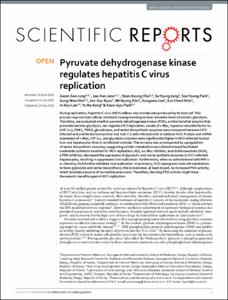KUMEL Repository
1. Journal Papers (연구논문)
1. School of Medicine (의과대학)
Dept. of Internal Medicine (내과학)
Pyruvate dehydrogenase kinase regulates hepatitis C virus replication
- Keimyung Author(s)
- Kang, Yu Na; Kim, Mi Kyung
- Journal Title
- Scientific Reports
- Issued Date
- 2016
- Volume
- 6
- Abstract
- During replication, hepatitis C virus (HCV) utilizes macromolecules produced by its host cell. This process requires host cellular metabolic reprogramming to favor elevated levels of aerobic glycolysis. Therefore, we evaluated whether pyruvate dehydrogenase kinase (PDK), a mitochondrial enzyme that promotes aerobic glycolysis, can regulate HCV replication. Levels of c-Myc, hypoxia-inducible factor-1α (HIF-1α), PDK1, PDK3, glucokinase, and serine biosynthetic enzymes were compared between HCV-infected and uninfected human liver and Huh-7.5 cells infected with or without HCV. Protein and mRNA expression of c-Myc, HIF-1α, and glycolytic enzymes were significantly higher in HCV-infected human liver and hepatocytes than in uninfected controls. This increase was accompanied by upregulation of serine biosynthetic enzymes, suggesting cellular metabolism was altered toward facilitated nucleotide synthesis essential for HCV replication. JQ1, a c-Myc inhibitor, and dichloroacetate (DCA), a PDK inhibitor, decreased the expression of glycolytic and serine synthetic enzymes in HCV-infected hepatocytes, resulting in suppressed viral replication. Furthermore, when co-administered with IFN-α or ribavirin, DCA further inhibited viral replication. In summary, HCV reprograms host cell metabolism to favor glycolysis and serine biosynthesis; this is mediated, at least in part, by increased PDK activity, which provides a surplus of nucleotide precursors. Therefore, blocking PDK activity might have therapeutic benefits against HCV replication.
- Publisher
- School of Medicine
- Citation
- Gwon-Soo Jung et al. (2016). Pyruvate dehydrogenase kinase regulates hepatitis C virus replication. Scientific Reports, 6, 30846–30846. doi: 10.1038/srep30846
- Type
- Article
- ISSN
- 0068-1261
- Appears in Collections:
- 1. School of Medicine (의과대학) > Dept. of Internal Medicine (내과학)
1. School of Medicine (의과대학) > Dept. of Pathology (병리학)
- 파일 목록
-
-
Download
 oak-2017-0378.pdf
기타 데이터 / 1.99 MB / Adobe PDF
oak-2017-0378.pdf
기타 데이터 / 1.99 MB / Adobe PDF
-
Items in Repository are protected by copyright, with all rights reserved, unless otherwise indicated.